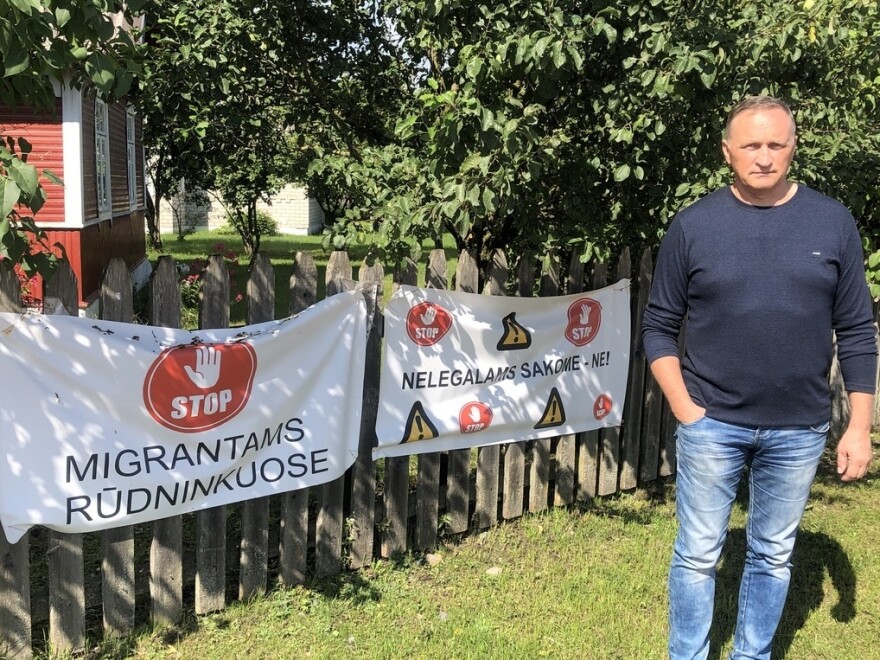Updated August 30, 2021 at 5:04 PM ET
RUDNINKAI, Lithuania — The group of people walks tentatively forward, escorted by Belorussian guards dressed in riot gear. Then the guards yell "Go!" physically pushing those who seem reluctant to take further steps.
This scene appears in one of several videos released by the governments of Latvia and Lithuania. They show thousands of people, most of them Iraqi, illegally entering the European Union in the last several weeks, with Belorussian officials appearing to shepherd them along.
In Lithuania, more than 4,000 people have entered the country this way — more than 500 times the figure for all of last year.
The three Baltic governments - Estonia, Latvia and Lithuania, all members of the European Union and NATO - call this a "hybrid attack" against them, the latest attempt by Belorussian leader Alexander Lukashenko to retaliate for EU sanctions.
The bloc has imposed punitive measures against Lukashenko's regime for last year's fraudulent elections; for violence against pro-democracy activists protesting the outcome; and most recently for faking a bomb threat to force a flight between Athens and Vilnius to land in Minsk, the Belorussian capital, so that an opposition journalist on board could be arrested.
"Belarus is weaponizing international migration and making a special path for irregular migration to the border of the two Baltic states, Lithuania and Latvia," says Marija Golubeva, Latvia's interior minister.
"This is not any sort of spontaneous emergence of a migration trail to our countries; this is a specifically directed action by the government of Belarus as perhaps a way to have revenge on the European Union for the sanctions that were imposed after the plane was hijacked," she says.
Belarus invites Iraqis to come as tourists, then sends them into the EU
Iraqi asylum-seeker Salad Sadeq Ali says the stories he hears in the government reception center where he lives just outside Riga, the Latvian capital, bear out the Baltic governments' allegations.
Though he arrived in Latvia using a human smuggler more than two months ago, Ali says most of the newer arrivals in the center confirm they booked flights from Baghdad to Minsk, got a tourist visa in their passports on arrival at the airport and then were helped by Belorussian officials to illegally cross the EU border.
Ali says when he was looking for a route to get to the EU he considered traveling through Belarus far too dangerous. "If they caught us, I thought we would get more than a year in prison," he said.
But once Belarus began advertising such trips to Iraqis, according to Lithuanian officials, large numbers of people began crossing into the EU every night. Recently Lithuania reinforced its border with barbed wire and extra guards, some sent from the EU and other countries.

Both Latvia and Lithuania also declared states of emergency on their Belorussian borders, which allows them to prevent people from entering and filing asylum claims.
Lithuanian Prime Minister Ingrida Simonyte acknowledges Lukashenko's tactic has had some short-term success.
"This problem was imposed on us very wickedly, I would say, because it was a high number of people within a very short period of time," she explained. "Definitely that was a very significant challenge and still is a very significant challenge for us to to find the places" to lodge them.
Small towns near the border worry about the arrivals
That challenge is playing out in the rural community of Rudninkai, about an hour from Vilnius, the Lithuanian capital. The migrant center, located at a nearby military training base, hosts more than 800 people and residents aren't happy about it.
At an intersection on the main road into town, a small group of men are chatting in front of a sign that reads: "Rudninkai says no to migrants." The men say they didn't put up the sign, but they readily admit to agreeing with it.
One of the group is the town's mayor Gennadi Baranovich, who says even he wasn't notified about it in advance.
"The government has tricked us," he explained. "They aren't telling people anything. If immigrants are coming here we should know what it means for our security."
Authorities wouldn't grant access to the residents of the Rudninkai camp, who are held behind high metal fences, and they only allowed a photo of the outside of the facility at a distance. But journalists were previously allowed to interview inhabitants, many of whom complained about their treatment.
Back at the Latvian holding center, Miks Celmiņs, director of the NGO Make Room Latvia, is helping outnumbered staff distribute food and other essentials to the inhabitants, who are almost all in quarantine because of a coronavirus outbreak.
Celmins says he understands his government feeling overwhelmed by the exponential increase in arrivals from Minsk, but he hopes Latvians have empathy for the migrants. "They are just victims of the situation," he said. "Obviously, this is somehow an organized criminal activity that is happening."
Lithuanian Foreign Minister Gabrielius Landsbergis says this should not just be a concern for the Baltics or the EU, but for the "whole democratic world," which he says "needs to wake up."
If Lithuania and Latvia hadn't blocked the Belorussian route, "it could be scaled and it could be used against anybody, because it's extremely, extremely easy," Landsbergis explained. "You just need a country or a rogue state that just stops the control of the border. To add to that, if it offers help for people to go to the border that it stops controlling, you have a hybrid attack."
Minsk is allegedly also channeling people to Poland. Estonia, Latvia, Lithuania and Poland have called on the U.N. Security Council to take up the issue. If the situation isn't resolved, they have agreed to raise it as an "Article 4" security threat with NATO, one degree below summoning all allies to come to their mutual defense.
Copyright 2021 NPR. To see more, visit https://www.npr.org.


